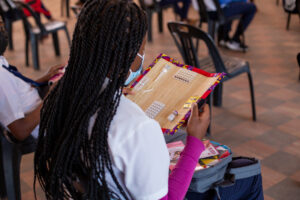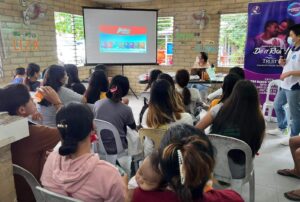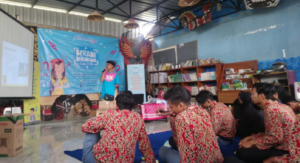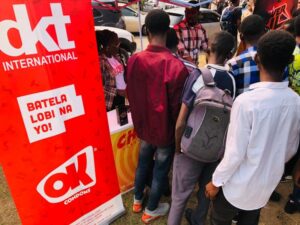Mitigating Teen Pregnancy with Comprehensive Outreach Strategies
By Charlotte Weiser, DKT International
Lharps Corciga, DKT’s marketing manager in the Philippines, was alarmed when she heard about a pregnant, 10-year-old girl who had been seen in a clinic in The Philippines, but she was not shocked.
Corciga said DKT Philippines is regularly invited by the Integrated Midwives Association (IMA) to go into schools and talk to teachers – but not the students – about contraception. The stigma associated with talking about sex and the cultural taboos that still exist in the country are so strong that many school principals won’t allow DKT staff to talk to students about sexual health, but will invite midwives into the schools to give pre-approved presentations directly to students.
DKT staff speak to educators and provide sexual and reproductive health (SRH) information and some products (condoms and lube) to teachers, while also providing oral contraceptive pills (OCs) to the school nurses. DKT has taken the approach to “educate the educators” in The Philippines with the hope that the most relevant information will filter down to students from the teachers and the midwives who speak directly to the students. The goal, Corciga said, is that contraceptive products will be distributed to students who need them and both the staff and students will be better equipped to seek out a health professional, counselor, and services through DKT Philippines when needed.
From stigma to sex-positivity: DKT’s teams offer a fresh take on sex ed
Adolescent pregnancy is defined as pregnancy in girls aged 10 to 19 and according to the World Health Organization (WHO), an estimated 21 million girls ages 15 to 19 in developing nations give birth every year. DKT International teams around the globe address the issue of teen pregnancy through youth-focused digital and in-person educational programs that offer fun, accessible, and affordable contraceptive options and information. Globally, 79% of individuals ages 15–24 use the internet and regularly use digital platforms to access news and health information. Digital and in-person access points – such as call centers, websites, and mobile clinics – allow DKT teams to connect with adolescents in a meaningful and impactful manner.
DKT serves to both influence and educate young people on sexual and reproductive health issues by making conversations about sex, sex positivity, and safe sex, current. In Latin America North, DKT Mexico runs DKT School, which is a free, social program that sends specialists to public and private middle and high schools, presenting comprehensive sexual education in a fun, engaging manner– free of prejudice. The curriculum was developed through DKT Mexico’s partnership with Amaze.org, a sexual education website that develops tailored animated videos about sexual development and health for young people. DKT then sends a team of trained specialists into schools to discuss topics such as contraceptives, gender, sexual diversity, human rights, sexual harassment, and more.
Using interactive games and presentations, DKT School makes taboo subjects fun and gives students confidence in their sexuality and self-expression. From August 2022 to December 2023, DKT School had 1,300+ events, educated 530,000+ students, and sampled around 430,000 condoms.
DKT Indonesia similarly has built the foundation for comprehensive engagement with young people through its Berani Berencana (BB)- “Dare to Plan”- campaign which includes on-the-ground initiatives, a network of call centers, and multiple social media access points. BB provides information about contraception, debunks common myths, and promotes safe sex and healthy relationships to Gen Z, and includes an Instagram, TikTok, and Facebook account, as well as a website. BB’s digital success is possible now because the team in Indonesia laid the groundwork for that success by visiting 210 schools and engaging with 30,000+ students between 2019 and 2021.
As in the Philippines, the educational work DKT was attempting in Indonesia and Mexico was opposed by school leadership. Still, team members in both countries steadily and diplomatically engaged with that leadership to ultimately, deliver SRH information to students.
Nurul Jannati, the marketing manager for DKT Indonesia, says that BB is the only platform in Indonesia that discusses contraception in an engaging way with young people. Indonesian culture is very conservative and there is a great deal of stigma that prevents young people from learning about contraception, Jannati said, but BB bravely opposes that, using trending sounds and video formats in its educational platforms and online videos to gain virality and draw Gen Z’s attention, while educating them. In Indonesia, positive student feedback to administration about the presentations and the work DKT was doing allowed teams to build a deeper trust with government and educational officials. Jannati said students often tell the BB team after the events that they learned a lot and enjoyed the presentation.
Jannati said they’ve found that they’re able to reach more people on digital channels because offline activation has restrictions imposed by schools for discussions related to contraception. Bureaucratic and cultural roadblocks still exist in Indonesian society, so teams present a variety of information openly through BB and reach remote areas where in-person outreach is difficult. Jannati mentions that in rural areas in Indonesia, sex education still isn’t great, but they do have internet access. She also notes that 50% of Postpil e-prescriptions, given through the BB call center, are for youth in rural areas, showing the massive impact DKT’s digital media campaigns have had on educational access for young people.
Bringing contraceptive methods to the last mile

A teenager in Mozambique studies her contraceptive options (oral contraceptives, condoms, injections, and more)
In Africa, youth programming similarly integrates digital media but is centered around last-mile and university student outreach. In Mozambique, “activistas” are community activists who engage individuals in conversations about different contraceptive methods. Beyond those conversations, activistas refer girls and young women in need to DKT’s mobile clinics, which provide contraception and SRH care to every province of Mozambique, including even the most remote areas. The mobile clinics are also free of charge and park in areas that are accessible to young people, such as near schools.
In the Democratic Republic of the Congo (DRC), DKT created Batela Lobi Na Yo, or “Protect Your Future.” Batela Lobi Na Yo is a youth program that engages university students and includes digital marketing campaigns that inform young people about sexual health, providing them with new information about contraception and its efficacy. It uses peer educators, or youth ambassadors, who journey to universities to talk to college-aged students about contraception and refer them to clinics. The initiative has been successful at reaching university students, but less so in reaching teenagers due to existing cultural stigma and taboos about premarital sex prevalent in many communities. The Batela Lobi Na Yo platform instead discusses menstrual hygiene with teenagers and gives them the full message about contraceptives once they reach university.
Confidential and convenient: chatbots and call centers enhance youth access to reproductive health services
DKT’s global teams have also developed some inventive ways to leverage mobile technology and connect the young people they meet during outreach events to DKT’s existing products and services. DKT Mexico has a WhatsApp number where patients have direct communication with a trained healthcare professional to receive quality answers to sexual health questions. In the DRC, Batela Lobi Na Yo links to a free chatbot supported by trained counselors who answer SRH questions and refer patients to nearby clinics. Mozambique similarly operates a free call center and website that provides resources on various SRH topics, including contraception and safe abortion.
In the Philippines, DKT runs the “Do it Right” website that features a confidential chatbot, managed by a medical officer, who answers contraception-related questions and helps patients find nearby partner midwife clinics for their health needs.
Jannati from DKT Indonesia said that the most popular content on the BB Instagram is for their call center, reels, and ads specific to emergency contraception (ECs), which is very popular with adolescent clients. DKT Indonesia’s BB Instagram posts videos and photos about ECs through the lens of “sex emergencies” – which they call “sexmergencies.” A post titled “Don’t be afraid if you have a sexmergency” received 5.7 million views, advising the viewer to “keep calm” if they’re having a sex-related emergency, contact the BB call center or message them via WhatsApp, where counselors can help them get Postpill. These ads likely contribute to the high number of Postpil e-prescriptions given through the BB call center.
Paving the way toward comprehensive and stigma-free sex education
Despite the cultural and bureaucratic barriers that still exist in many of DKT’s markets, our commitment to providing young people with accurate sexual and reproductive health information is unwavering. By utilizing a multifaceted approach that includes digital media campaigns, interactive school programs, and innovative outreach methods like chatbots and call centers, DKT continues to break down stigmas and promote safe, informed choices for youth around the globe.



